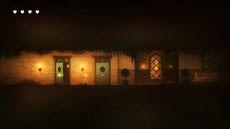The Last Door: The Playwright Preview – New Cast, New Mystery
The Last Door‘s first season ended on a cliffhanger, leaving me wondering what was going to become of poor Devitt. It seems that we’re not going to find out for a while, as the first episode of the second season, The Playwright, puts us in the shoes of Doctor Wakefield, his therapist. Looking into the weird circumstances in which his patient has disappeared, it’s not long before Wakefield ends up in as strange a situation as the man he’s looking for. While short on outright scares, the newest chapter of The Last Door shows developer The Game Kitchen is still staffed by masters of story.
The evil behind the events of The Last Door is going to be pretty complex by the complete game’s end, that’s for sure. The series has been very good at introducing story elements slowly, picking away at the meaning behind the surreal events that the characters experience. Knowing Devitt was unhinged in the last one made some of the weird events make their own crazy sense, though, so we expected to see some strange things. Wakefield is his doctor, though, and outside of those events, but that doesn’t mean he’s not in for some weird goings-on. I thought having an outsider might cut through some of the complexities the game has set up, but with what I saw in this episode, I’m only more confused and intrigued.
Wakefield, following a line of people whose stories eventually lead to Devitt’s disappearance, has ended up in an Asylum in London looking for answers. His story, being the start of a new season and coming from a fresh, non-crazy viewpoint, starts off more slowly, and with more emphasis on storyline than scaring the player. There really weren’t any scares in the game, and the mood is one of mystery instead of fear. There were only one or two moments in it that felt eerie, although the game doesn’t feel any less powerful because of it.
The puzzles are fairly straightforward in this point-and-click horror game. The series has had a few difficult puzzles that fell into the trap of trying every item on everything before, but The Game Kitchen has moved past that. They have gotten better at giving clues as to which items are to be used where, if you pay attention to the dialogue and item descriptions. It makes the game flow really well, as there were never moments where I struggled for long to figure out what to do. Don’t expect a hint system to help you out, though, as the developers have already given enough clues as to what to do. There were still a few instances where I had to search a spot twice to find something, though, so they still have a few issues with hiding items in hard-to-find places. But overall, items are simple enough to find (just check everything at least twice), and their use is made clear without sacrificing player immersion with a hint system. It’s point-and-click made elegant; just how I like it.
The Playwright‘s story kept me playing. The events within it didn’t add much clarity to the game’s storyline, but were interesting and twisted, showing that, after playing through the entire first season, I still knew very little of what was going on. I had a better idea of what to call the evil from the first season, and knew that exposure to it had done a horrible number on many people, but still little else. Even so, the victims in this game seemed more coherent and capable of communicating what had happened to them. Instead of seeing what had happened from the viewpoint of the madman I was playing as, I got the viewpoints of several different madmen I talked to. Lucky me.
I was also impressed at the way the asylum was presented in the game. Horror games tend to have asylums filled with dangerous, bloodthirsty lunatics, whereas the asylum in The Playwright contained people who were coherent and kind, for the most part, but were just dealing with horrible pasts or different, possibly upsetting world views. They seemed harmless, and were just people who were dealing with some mental issues. The staff, while a bit careless, were not trying to lobotomize or harm people, and were just having trouble working under limited staffing. There was still one instance of a creepy horror asylum cliché, but otherwise it was a nice break for the typical horror trope.
The game travels to several other locations, all in The Game Kitchen’s wonderful pixel art style. I am always stunned at how the game can utilize larger pixels, evoking what appears to be a primitive style, and make the game more sophisticated in the process. The style uses broader strokes, creating an almost-abstract look that hints at what you are looking at rather than blatantly tell you what it is. Sometimes you have to look closer to know what you’re looking at, and sometimes it leaves you unsure and frightened of what you’re seeing. Is that blood on the floor? What’s wrong with that man’s face? The uncertainty adds a lot to the game’s mood and mystery, enhancing the playthrough.
The soundtrack from Carlos Viola makes it all come alive, once again. The haunting score makes the back alleys and depressing asylum come to grim life, and is subtle in how it affects the player’s mood. Again, it’s more mysterious than spooky, backing away during the game’s few scary moments. Still, the sound design is fantastic, with wonderful creeping footsteps and quiet breathing to set the mood. The series continues to excel at knowing what sounds will ramp up the mood, never giving the player a break from it even when it’s quiet. It’s the final stroke that gives the pixels their strange life, as all good sound design does. Where the visuals might break the immersion for some, the sound design makes it all seem strangely real.
If this all sounds good to you, then I’m happy to point out that the game is completely free if you’re willing to wait long enough. Instead of charging for the game, The Game Kitchen releases each episode for free after they complete the next episode’s development. If you want to play this episode now, you can make a donation to the development of that next episode. It seems like splitting hairs, but it means that patient players can wait and get the game completely free, or they can pay to help the developers continue to follow their dreams and get the newest episode instantly. Not a bad system depending on your financial situation.
More concerned with setting up story and having been told from the more stable viewpoint of Wakefield, The Last Door: The Playwright is less frightening than many of its previous episodes. The lack of scares is more than made up for by the continuation of its excellent, strange storyline, adding new facets to it that kept the narrative hooks in. The few answers I thought I had at the end of the last chapter have only lead to more questions here, and I continue to be excited for the next episode to release as I try to figure out just what is going on in this strange world.
The Last Door: The Playwright will be available for free once the crowdfunding for the next chapter is complete, but you can unlock it to play now for a minimum $1 donation on their site. The previous chapters are available for free on their site, on Google Play, and the App Store, or as a collection for $9.99 on Steam. You can learn more about the developers and the game by following them on Facebook and Twitter.






